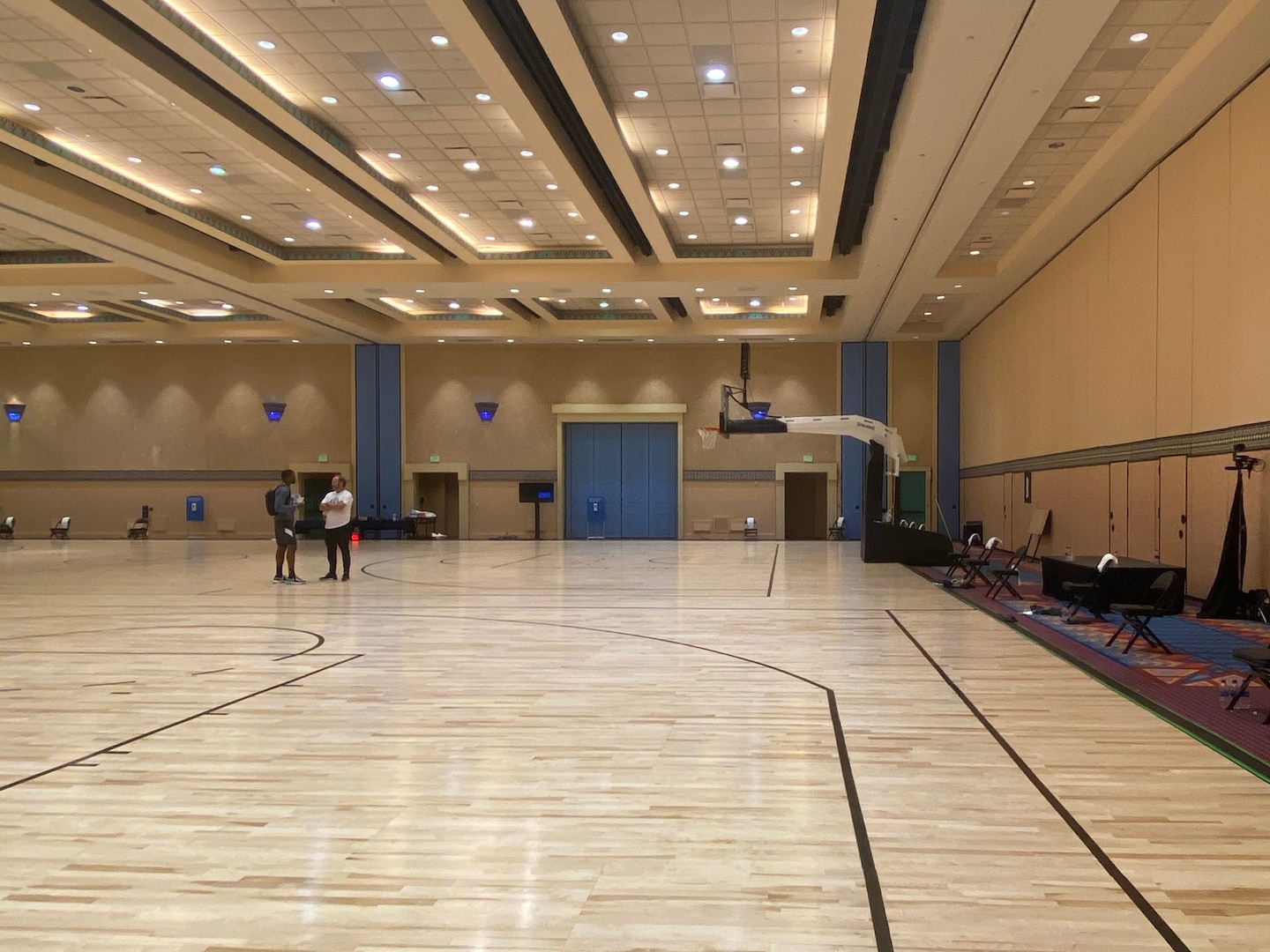At NBA bubble practices, ballrooms are gyms and stars stare back at themselves in interviews

About 10 reporters, angling for space around a massive television monitor used to facilitate a virtual interview with media members around the country, had inched too close for the league’s comfort. After the session, an NBA staffer pulled out a roll of black tape and marked off a protected zone to ensure proper social distancing. The quick-thinking adjustment was a reminder that many aspects of the NBA’s restart at Disney World remain works in progress, even as the league announced Monday that none of the 346 players living inside the bubble tested positive for the coronavirus during the past seven days.
Practices opened to the full media contingent Monday, with the Lakers taking the court at The Arena at ESPN’s Wide World of Sports Complex. Outside the building, a table saw and a stack of wood pallets greeted reporters as they arrived via chartered bus from media housing. Inside, huge dark curtains prevented reporters from seeing the playing court, which also appeared to be under construction. Makeshift signs posted to doors directed traffic throughout the venue’s ground floor.
James sat in a chair in a secluded wedge just removed from the concourse hallway’s hustle and bustle. Players and coaches, unlike media members and public relations staffers, were not required to wear masks during interviews Monday, though a league memo instructed teams to begin wearing them Tuesday. James was relaxed, patient and smiling throughout his trial run, even when loud static feedback briefly sabotaged the virtual interview.
“It’s 2020,” James said, when asked how he was adjusting to life inside the NBA’s bubble. “Nothing is normal in 2020. Nothing seems as is. Who knows if it will ever go back to the way it was? It’s 2020. It’s different from the vision 20/20. It’s not that clear.”
Even that interview, a fundamental element of journalism, was a major departure from traditional norms. In Los Angeles before the pandemic, more than two dozen reporters regularly jockeyed for position during James’s postgame locker room interviews. The scene often required crowd control from team staffers and security guards to ensure that the other Lakers could access the showers. Cameramen might push and shove each other for prime position, while reporters fought to catch James’s attention by calling his name or raising their voices to ask their questions.
Here, locker room interviews are prohibited and all one-on-one opportunities require approval from NBA or team public relations staffers. For James’s interview Monday, there was only a camera attached to the top of the large television monitor, an ESPN camera and a few smartphones filming him in front of a simple backdrop. An on-site staffer took requests for questions from reporters in attendance and relayed them to an off-site staffer who coordinated similar asks from dozens of reporters who weren’t in the bubble but were invited to a Zoom call.
James, who often seeks to make eye contact with reporters who ask him questions, was asked by a team official to instead address his answers to the large screen in front of him. All players and coaches have been given similar instructions, a reminder that the NBA’s restart is made for television and social media. To further complicate matters, that screen displayed video of James’s interview back to him. To re-create the scene at home, one should stare into a mirror while answering questions from voices scattered around his or her bathroom.
While The Arena and the nearby Visa Center are full-sized sports venues, the 22 teams assembled in Florida must book court time in three-hour increments at a variety of improvised locales around Disney World. Full hardwood courts have been wheeled into large rooms at the Coronado Springs Resort’s convention center, where high-arcing shots meet low-hanging ceilings. The surfaces there, and at the other practice and game facilities, are meticulously cleaned and disinfected after each team’s session.
Giannis Antetokounmpo, Khris Middleton and the Milwaukee Bucks practiced at the Coronado’s Fiesta Ballroom on Monday, a vast space that looked suitable for a wedding reception or a regional sales conference. When practice finished, they grabbed to-go meals from a smaller team room and walked, with ice packs still on their knees, along endless hallways of orange and green carpeting back to their hotel. Middleton addressed the media in the same manner as James, cracking up when his feed scrambled and a reporter’s voice slowed to a halt mid-question.
Only three reporters were present to hear Coach Mike Budenholzer’s address after 8 p.m. local time, though more than twice as many listened in from afar. The smaller-market, tight-lipped Bucks have never drawn hordes of media like James, but they played to sellout crowds of nearly 18,000 fans in Milwaukee while posting a league-best 53-12 record before the shutdown. Antetokounmpo has established himself as one of the sport’s biggest stars, yet he departed the scene in peace with his older brother and teammate, Thanasis.
Budenholzer wasn’t bothered by the deserted practice or the idea that near-empty arenas will greet the Bucks once scrimmages begin Wednesday and the regular season resumes July 30.
“I played Division III ball, so I’m very used to playing in front of very small crowds,” joked the league’s reigning coach of the year, who graduated from California’s Pomona College in 1993. “Our focus will be on doing what we do [normally], keeping focus on how [our players are] being good for the Bucks defensively and offensively. Just doing your job. We’re a team that tries to be very steady from the start of the game to the end. Hopefully the day-to-day routines that we put a lot of value in will carry over to the different environment.”






